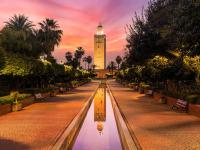Lisbon sits on the river Tagus, gifting it access to the coast that made Portugal one of world's most successful trading nations. Explorers including Vasco da Gama, Magellan, and Bartolomeu Dias sailed on behalf of their monarch, discovering new lands and establishing new trade routes. The city prospered, with much of the proceeds from their colonies spent on opulent architecture. On the morning of All Saints Day 1755, Lisbon's faithful were huddled in church when a 7.7 magnitude earthquake struck, followed by a series of tsunamis that devastated the city. Candles lit for the religious ceremonies began a firestorm. By the end of the day, more than 75 percent of the population had perished. Current-day Lisbon reflects this tragedy, with few buildings pre-dating the 18th century, but money spent to rebuild the city was spent doggedly, creating a city of wide boulevards, sensible facades and parklands, all backed by opulent Baroque interiors and paved by unique black and white-tiled pavements. With a relatively small population, Lisbon is an easy city to navigate. Its hillside suburbs are accessed by trams and funiculars while its waterfront remains a busy harbor, ready to continue the trading prowess that made the city famous. We disembark Douglas Mawson and take a locally guided tour of Lisbon. The city's story unfolds as we visit the suburb of Belem, with its Monastery of Jeronimos to hear more of Vasco da Gama's adventures; the waterfront memorial of Monumento aos Descobrimentos, honoring Prince Henri the Navigator and his fellow explorers; and the Torre de Belem - the 16th-century fortification which acted as the gateway to Lisbon for all seafarers. This insightful tour tells tales of exploration, colonization, and devastation wrapped together by the history of a city whose influence has shaped much of our modern-day world. Near the famed Cais do Sodre train station, the beautiful building of the Mercado da Ribeira sits topped with a Moorish-style dome. To end our tour, we visit this famous market and its popular 'Time Out' food complex. Lisbon's populace has shopped for fresh fruit, vegetables, fish, and meat here since 1882, with the market's latest offerings including 30 'pop-ups' offering petiscos (Portuguese tapas) and traditional products such as cheeses, cured hams, smoked sausages, fish conserves, wines and more. Our local guide introduces us to a variety of Portuguese specialties, such as pasteis de Nata - the Portuguese custard tart with a rich egg custard nestled in shatteringly crisp pastry that is a national specialty. Take time to explore and enjoy lunch (own expense), before transferring to your hotel mid-afternoon. This evening, we gather to celebrate our journey at a traditional Portuguese Farewell Event. Accommodation: Altis Grand Hotel Lisbon (or similar) ...
Read More

















